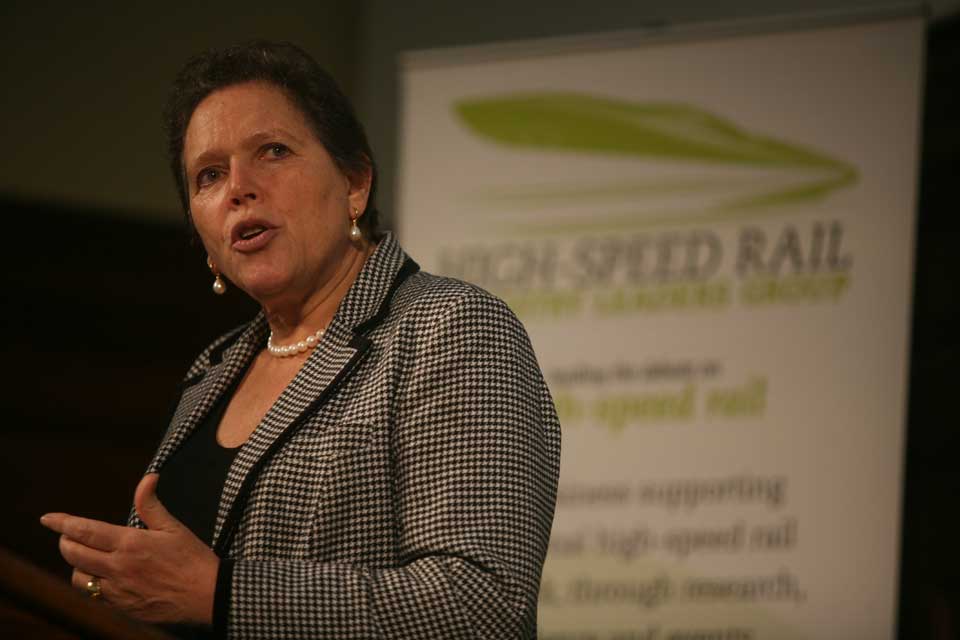Railway Engineers Forum
Discusses current transport issues and the benefits of HS2.


Opening comments
Good morning everyone…
I’m delighted to be here today (21 October 2013)…
And to be giving my first speech as Minister of State for Transport to the Railway Engineers Forum.
It seems appropriate that my first speech should be on High Speed 2 – a project of such national importance.
So thanks for inviting me.
My interest in transport goes back a long way.
I ran a business advising on infrastructure finance in Central and Eastern Europe.
I was on the board of Transport for London.
And I was Liberal Democrat Shadow Transport Secretary– under the leadership of Sir Menzies Campbell.
So I’ve taken a close interest in HS2 over the years.
Today (21 October 2013) I want to set out the choices that I believe we face as a country…
Choices that are not about party politics…
HS2 is far too important for that.
But choices about how we can become more competitive…
How we can meet rapidly rising demand for mobility…
And choices about our ambitions for Britain in the decades ahead.
Ambition and vision
As engineers, you will understand the importance of ‘ambition.’
The great British engineering pioneers of the 19th century were ambition personified.
The railway they built faced just as much criticism and opposition as major infrastructure schemes do today.
But they succeeded in overcoming those challenges.
And it’s remarkable that so much of what they built is still standing.
Men like Brunel and Stephenson left us an incredible legacy – of beautiful and technologically brilliant bridges and tunnels, stations and rail lines – that endure to this day.
But what did not endure was their ambition.
Their vision for a better future.
And the determination to deliver that vision.
Somewhere along the way, we lost our reputation as a global infrastructure leader.
And we’re paying the price for that today (21 October 2013).
The problem
The key challenge is this.
Since 1970 the total distance we travel in Britain has more or less doubled.
Demand for rail has doubled in less than 20 years.
In coming decades that will go up again.
Because there should be no doubt - the world is going to travel more.
Our competitors like China, like Germany, like France are preparing for this.
Using the best new technology.
While we have built very little new infrastructure to support growth.
In Britain we try to patch up what we have already got.
We haven’t built a new mainline railway north of London for almost 120 years.
But there is a point when patching up isn’t enough.
That’s why our railway is creaking under the strain today.
And we have to do something to create the capacity we need to grow.
Alternatives?
Simply upgrading existing lines is not a practical solution.
We have studied the alternatives to HS2, and both Network Rail and Atkins confirm they will not offer the same benefits.
We have considered 5 different packages of rail improvements as alternatives to phase 1 of HS2.
Not only did these projects fail to deliver the astonishing extra capacity that HS2 will.
The scale of work required for upgrades would cause so much disruption that the system would grind to a halt.
I am sure commuters on the West Coast Mainline will remember the problems caused during the £9 billion upgrade programme…
Yet the extra capacity released by this huge project has already been filled, and with passenger numbers growing, thousands of commuters are standing during the morning peak.
And despite the huge investment, it wasn’t enough to finish the job.
The overhead wiring on the West Coast line is getting on for 50 years old.
If upgrading existing lines were a feasible and effective answer to rising demand…
And a genuine alternative to HS2…
Believe me – we would do it.
Other investments
We are already doing everything we can to invest in the wider transport system.
In fact we have announced the most ambitious transport investment package for decades – over £70 billion across the next Parliament.
We are delivering the biggest rail modernisation programme since the Victorian era.
We’re building Crossrail, the biggest construction project in Europe, and upgrading Thameslink.
We are transforming the line to Wales and the west of England as part of a much wider programme of electrification.
And both the Great Western and East Coast lines will benefit from new state of the art trains through the Intercity Express Programme.
We are tripling the national roads budget, and adding 400 extra lane miles of motorway.
And we’re spending £6 billion in this Parliament and £12 billion in the next to maintain local roads.
So critics who claim that there are alternatives to HS2 that offer the benefits we need…
Or that HS2 will suck investment from other essential transport improvements are simply wrong.
HS2
Most fundamentally, Britain needs HS2 because we are running out of capacity on our most important routes.
Even the investment I’ve outlined today (21 October 2013) won’t be nearly sufficient to absorb rising demand from passengers and freight.
On intercity rail routes, passenger numbers have doubled in just 15 years.
Without HS2, our main rail line connecting London, the Midlands and the north will be overwhelmed by the middle of the next decade.
More passengers will be forced on to short-haul air services or the road network, generating ever-rising levels of carbon and congestion.
So we need a high capacity answer.
And that’s what HS2 provides.
High Speed 2 would be capable of carrying 14 trains an hour in each direction, rising to 18 trains when the network is complete, each capable of carrying up to 1,100 passengers.
As long distance services transfer onto HS2, capacity will be created on the existing network.
That means more room for local trains.
More room for direct services to London from places that can’t get them today.
And more room for freight trains, to free up our motorways. Forecasts suggest rail freight could double in this country between 2008 and 2030.
While road traffic is predicted to grow by 46% between 2010 and 2040.
HS2 will play a crucial part in unlocking our crowded tracks and releasing capacity so we can get more commuter trains into key cities, and more freight onto rail.
Engineering benefits
It will also offer a fantastic opportunity for railway engineers.
We already have a vibrant rail engineering sector in this country.
But building our own high speed system will give us the chance to develop new experience and expertise.
Phased construction will support a robust domestic supply chain –. It will be my task to encourage and support the development of that supply chain.
And that leads to thousands of new jobs, an opportunity for a new generation of young people both in the north and south of the country to find work and learn life-changing skills
But it will also equip hundreds of engineering businesses to export their products and know-how to markets around the world…
And get a slice of this boom industry abroad.
Cost and economic benefits
Of course we need to build HS2 within or under budget.
We will.
The budget for HS2 is £42.6 billion. Not the scare stories I’ve heard in recent months claiming a cost of £70 billion.
It’s £42.6 billion.
Spent carefully over several decades.
For a full network to Leeds and Manchester.
And that is an upper limit with a contingency - £14.4 billion in reserve which we are determined to bear down on.
The head of Network Rail said in July he expects the final cost of construction to be significantly less than £42.6 billion.
Two months ago the chiefs of 8 of Britain’s largest engineering companies wrote to the Daily Telegraph to say: Building it on time and within budget is well within the capabilities and ambition of the British construction industry.
The critics were wrong about High Speed One. And they will be wrong about HS2.
High Speed Two will also pay for itself in the jobs and prosperity it will create.
We have to do this in conjunction with local communities and local people. But the potential for development has been evident in HS1 and you only have to look at the rebirth of St Pancras and Kings Cross to see what gains can be made.
We recently published the findings of a new report by KPMG.
It addresses that vital question: will HS2 create jobs and growth in the north and Midlands, where they are needed most?
The answer is absolutely clear.
High Speed Two will provide a £15 billion annual boost to the economy. With the north and Midlands gaining at least double the benefit of the south.
The economic case for HS2 remains strong.
Our appraisal and analysis is consistent with international best practice.
Later this year we will publish a new cost benefit analysis as part of the wider strategic case - and it will be positive.
But we must also remember that economic models alone do not provide a full picture of the value of transport schemes or how they benefit the country as a whole.
If we had only followed economic models, we might not have built the M1 or M25, or extended the Jubilee Line to Canary Wharf.
Conclusion
So, in summary, HS2 will link our biggest cities, and create at least 100,000 jobs.
It will transform connections to and from the north and Midlands, and make us a more equal and balanced nation.
And it will deliver a huge boost to our railway industry.
We will build HS2 responsibly and within budget, and it will become part of the fabric of the country.
Like the motorways or the tube, it will be one of those things that makes life easier and our economy stronger.
It will be fast, efficient and reliable. And it will be affordable.
But most importantly of all, it will give us the capacity we need to grow as a country.
Certainly, it’s ambitious.
But those 19th century pioneers taught us that ambition is something we should embrace…
If we want to keep up with our competitors…
If we want to build a more prosperous future…
And if we want Britain to have a world class railway.
Thank you.